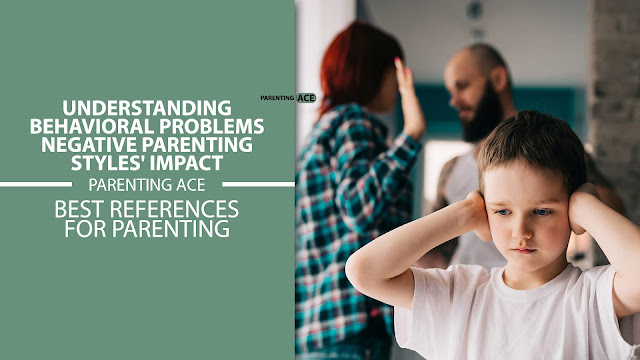Understanding Behavioral Problems: The Impact of Negative Parenting Styles
Unlocking the link between parenting styles and behavioral problems reveals a critical aspect of child development. In this blog post, we embark on a journey to explore how negative parenting styles impact children's behavior, delving into the ramifications of authoritarian, permissive, and uninvolved approaches. From the stifling effects of authoritarianism to the laissez-faire atmosphere of permissiveness, we uncover the detrimental effects on children's emotional well-being and social interactions. Join us as we unravel the complexities of parenting styles and discover strategies to foster positive behavior and healthy development in children, laying the foundation for a brighter future.
 |
| Understanding Behavioral Problems: Negative Parenting Styles' Impact |
Parenting styles play a crucial role in shaping a child's behavior and overall development. While positive parenting styles can foster resilience and emotional well-being, negative parenting styles often lead to behavioral problems and psychological challenges in children. In this article, we delve into the impact of negative parenting styles on behavioral problems and explore strategies to mitigate these issues.
The Role of Parenting Styles
Parenting styles are typically categorized into four main types: authoritative, authoritarian, permissive, and uninvolved. Among these, authoritative parenting, characterized by warmth, responsiveness, and appropriate levels of control, is associated with the most positive outcomes for children. Conversely, authoritarian, permissive, and uninvolved parenting styles tend to have detrimental effects on children's behavior and psychological well-being.
Behavioral Problems Arising from Authoritarian Parenting
Authoritarian parenting is marked by high levels of control, strict discipline, and low warmth and responsiveness. Children raised in authoritarian households often experience feelings of fear, resentment, and rebellion. They may exhibit behavioral problems such as aggression, defiance, and antisocial behavior as they struggle to cope with overly harsh rules and punishments imposed by their parents. Moreover, these children may lack self-confidence and autonomy, leading to difficulties in social interactions and academic performance.
Behavioral Issues in Permissive Parenting Environments
Permissive parenting, characterized by high warmth and responsiveness but minimal control and discipline, also contributes to behavioral problems in children. In permissive households, children may lack clear boundaries and consequences for their actions, leading to a sense of entitlement and disregard for authority. As a result, they may engage in impulsive behaviors, lack self-control, and struggle with academic achievement and social relationships. Additionally, children raised in permissive environments may experience anxiety and insecurity due to the absence of structure and guidance from their parents.
The Impact of Uninvolved Parenting on Child Behavior
Uninvolved parenting, where parents exhibit low levels of warmth, responsiveness, and involvement in their children's lives, has severe consequences for children's behavioral development. Children raised in uninvolved households often feel neglected, unloved, and unsupported by their parents, leading to emotional and behavioral issues such as depression, low self-esteem, and substance abuse. Without proper guidance and supervision, these children may engage in risky behaviors and struggle to form healthy relationships with others.
Mitigating Behavioral Problems Through Positive Parenting Practices
To address behavioral problems stemming from negative parenting styles, it is essential for parents to adopt positive parenting practices that promote healthy development and well-being in children. This includes cultivating warmth, empathy, and open communication with their children, setting clear and consistent boundaries, and providing appropriate levels of guidance and support. By fostering a nurturing and supportive environment, parents can help their children develop self-discipline, emotional regulation, and social skills, ultimately reducing the likelihood of behavioral problems and promoting positive outcomes in the long run.
In conclusion, negative parenting styles have a profound impact on children's behavior and psychological well-being, often leading to a range of behavioral problems and challenges. Authoritarian, permissive, and uninvolved parenting styles can contribute to aggression, defiance, low self-esteem, and other behavioral issues in children. However, by adopting positive parenting practices characterized by warmth, responsiveness, and appropriate guidance, parents can mitigate these problems and foster healthy development in their children. Recognizing the importance of parenting styles and their influence on children's behavior is essential for promoting positive outcomes and nurturing thriving individuals in society.




